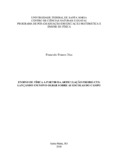| dc.creator | Dias, Franciele Franco | |
| dc.date.accessioned | 2018-12-17T16:43:18Z | |
| dc.date.available | 2018-12-17T16:43:18Z | |
| dc.date.issued | 2018-07-04 | |
| dc.identifier.uri | http://repositorio.ufsm.br/handle/1/15116 | |
| dc.description.abstract | This research has as its objective the investigation of theoretical and practical elements that may guide the organization of didactic-methodological strategies anchored within a linking of Freirean premises and the Science-Technology-Society (STS) Focus. The intent is to contribute to the teaching-learning process in Physics in Rural Schools. The following research question was posed: “What theoretical and practical elements may guide the organization of didactic-methodological strategies for Physics teaching in Rural schools by approaching Freire to STS?” In an attempt at answering the it, we conducted a qualitative study using the following instruments: bibliographic survey of the minutes of the main events in the Physics/Science education area; semistructured interviews with the principals and the Physics teachers from the two Rural schools in a municipality of the central region of Rio Grande do Sul State; an analysis of the Political-Pedagogical Projects of these schools; and a semistructured interview with the Advisor for Rural Schools of the Regional Education Coordination body that oversees them. Data analysis was performed using Content Analysis, through which we arrived at the following emerging dimensions: (1) Education in the Field or Education of the Field?, (ii) Didactic-methodological strategies for the teaching of Physics, and (iii) Challenges and possibilities for the teaching profession. The results demonstrate that the lack of initial and continuing education which provides support for a discussion and understanding of rural issues harms the Physics teaching-learning process in Rural schools. The curriculum in the researched schools does not appear to have been constructed based on issues related to the school’s context. Therefore, it became evident that continuing education guided by the Freire-STS link could contribute to the teaching-learning process of Physics and to the education of the subjects in the field. | eng |
| dc.description.sponsorship | Coordenação de Aperfeiçoamento de Pessoal de Nível Superior - CAPES | por |
| dc.language | por | por |
| dc.publisher | Universidade Federal de Santa Maria | por |
| dc.rights | Attribution-NonCommercial-NoDerivatives 4.0 International | * |
| dc.rights.uri | http://creativecommons.org/licenses/by-nc-nd/4.0/ | * |
| dc.subject | Ensino de física | por |
| dc.subject | Escolas do campo | por |
| dc.subject | Ensino médio | por |
| dc.subject | Articulação Freire-CTS | por |
| dc.subject | Physics teaching | eng |
| dc.subject | Rural schools | eng |
| dc.subject | High school | eng |
| dc.subject | Freire-STS link | eng |
| dc.title | Ensino de física a partir da articulação Freire - CTS: lançando um olhar sobre as escolas do campo | por |
| dc.title.alternative | Physics teaching through the Freire - STS link: casting a glance at field schools | eng |
| dc.type | Dissertação | por |
| dc.description.resumo | A presente pesquisa tem como objetivo investigar elementos teóricos e práticos que podem balizar a organização de estratégias didático-metodológicas ancoradas na articulação dos pressupostos Freireanos e do enfoque Ciência – Tecnologia - Sociedade (CTS) visando contribuir com o processo de ensino-aprendizagem de Física nas escolas do campo. Nesse sentido, buscando responder nossa questão de pesquisa “Quais elementos teóricos e práticos, a partir da aproximação Freire – CTS, podem balizar a organização de estratégias didático-metodológicas para o Ensino de Física nas escolas do campo?”, realizamos uma pesquisa de cunho qualitativo a partir dos seguintes instrumentos: levantamento bibliográfico nas atas dos principais eventos na área de ensino de Física/Ciências, entrevistas semiestruturadas com as diretoras e os professores de Física das duas escolas do campo de um município da região central do estado do Rio Grande do Sul, análise dos Projetos Político Pedagógicos dessas escolas e entrevista semiestruturada com a Assessora das Escolas do Campo da Coordenadoria Regional de Educação a qual as escolas fazem parte. A análise dos dados foi orientada pela Análise de Conteúdo, chegando às seguintes dimensões emergentes: (i) Educação no Campo ou Educação do Campo?, (ii) Estratégias didático-metodológicas para o ensino de Física e (iii) Desafios e possibilidades para o trabalho docente. Os resultados evidenciam que a falta de formação inicial e continuada que dê suporte para a discussão e o entendimento das questões do campo prejudicam o processo de ensino-aprendizagem de Física nas escolas do campo. A pesquisa nos permitiu perceber que, nas escolas pesquisadas, o currículo não é construído a partir de questões relacionadas ao contexto das escolas. Portanto, evidenciamos que formações balizadas na articulação Freire - CTS poderiam contribuir com o processo de ensino-aprendizagem de Física e com a formação dos sujeitos do campo. | por |
| dc.contributor.advisor1 | Leonel, André Ary | |
| dc.contributor.advisor1Lattes | http://lattes.cnpq.br/6703447252635796 | por |
| dc.contributor.referee1 | Muenchen, Cristiane | |
| dc.contributor.referee1Lattes | http://lattes.cnpq.br/0008067199219325 | por |
| dc.contributor.referee2 | Brick, Elizandro Maurício | |
| dc.contributor.referee2Lattes | http://lattes.cnpq.br/2410455109298846 | por |
| dc.creator.Lattes | http://lattes.cnpq.br/5896333255858169 | por |
| dc.publisher.country | Brasil | por |
| dc.publisher.department | Educação | por |
| dc.publisher.initials | UFSM | por |
| dc.publisher.program | Programa de Pós-Graduação em Educação Matemática e Ensino de Física | por |
| dc.subject.cnpq | CNPQ::CIENCIAS HUMANAS::EDUCACAO | por |
| dc.publisher.unidade | Centro de Ciências Naturais e Exatas | por |



